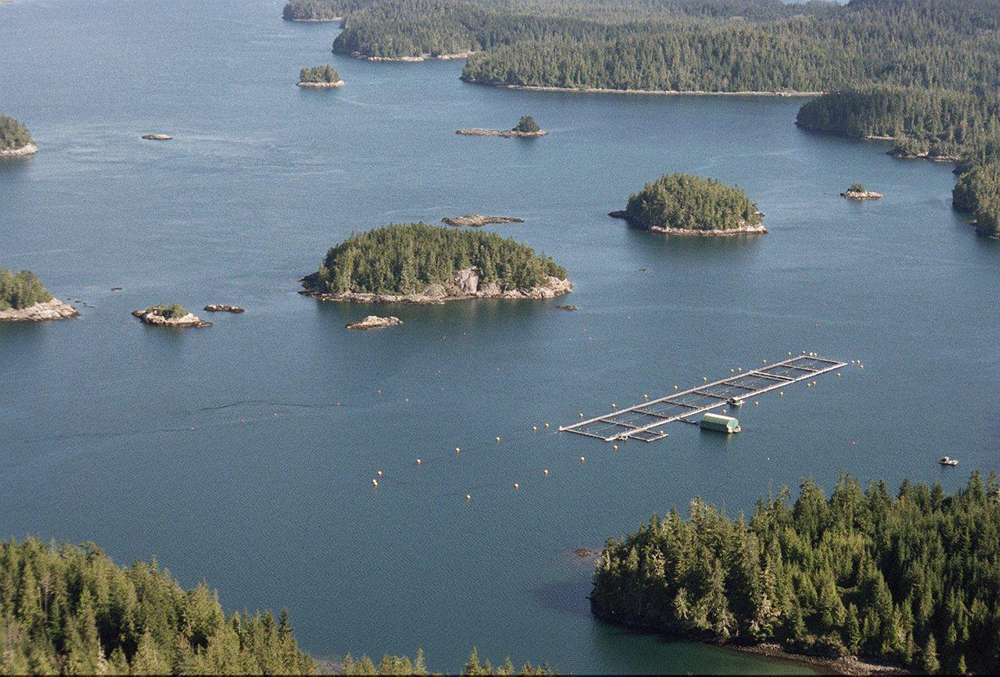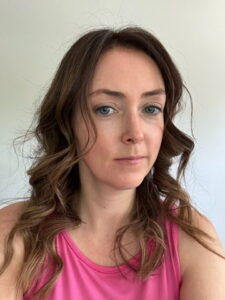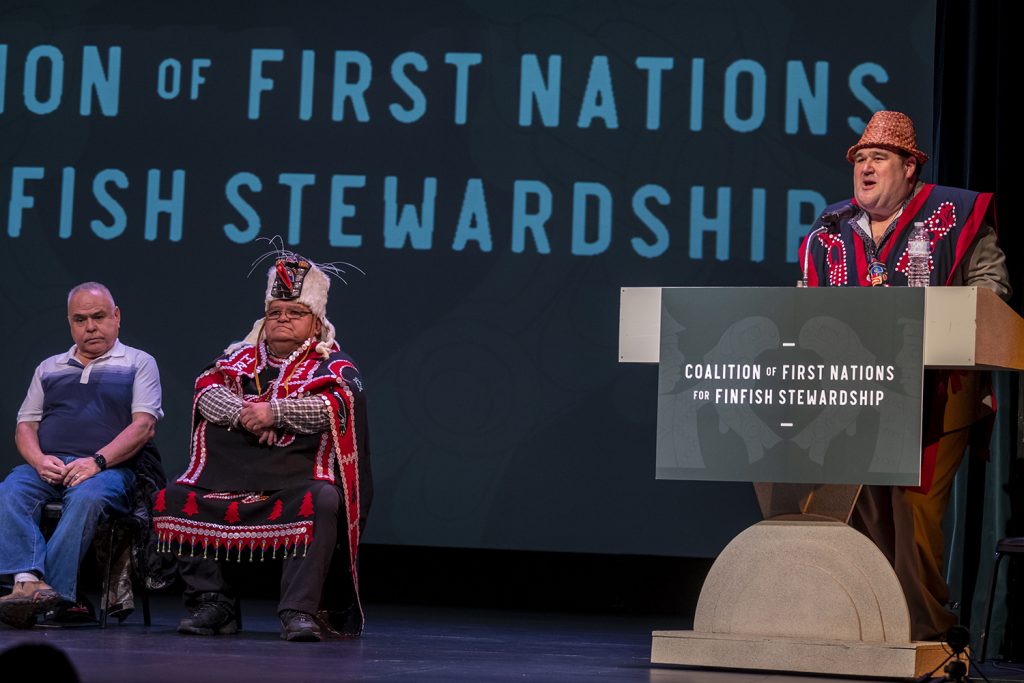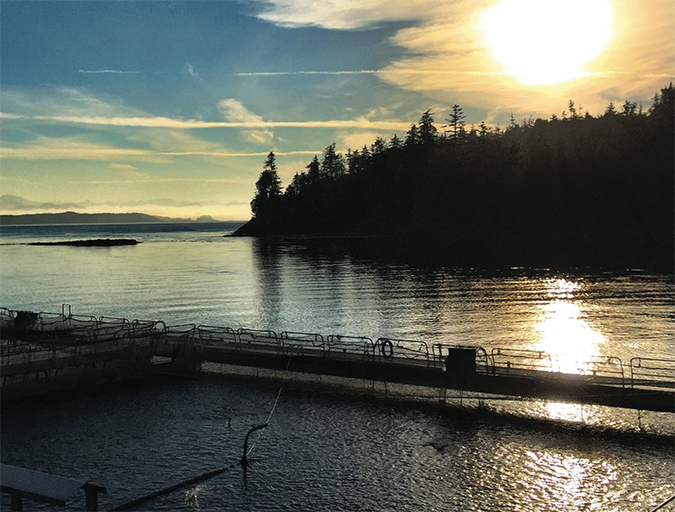Aquaculture industry reacts to ‘short-sighted’ decision to close open-net pen BC salmon farms in 2029

On Wednesday, the Canadian federal government announced it will ban open-net pen salmon farms off the coast of British Columbia, but closures will be delayed until 2029. This extension is intended to allow the transition from offshore aquaculture to closed containment systems on land.
“The government is firmly committed to taking concrete steps to protect wild Pacific salmon,” said The Honourable Diane Lebouthillier, Minister of Fisheries, Oceans and the Canadian Coast Guard. “Today, I’m announcing the essence of a responsible, realistic and achievable transition that ensures the protection of wild species, food security and the vital economic development of British Columbia’s First Nations, coastal communities and others, as we keep working towards a final transition plan by 2025.”
In 2019, the Liberal government decided to ban open-net salmon farming and switch to closed containment technologies to protect the declining wild Pacific salmon populations. To facilitate the transition, Minister Lebouthillier said that salmon farming licenses will be renewed for five years, starting on July 1, 2024. These licenses will have stricter rules to ensure management of sea lice, require more detailed industry reports and additional monitoring of marine mammal interactions.
“These changes aim to protect wild species and the marine environment while allowing salmon farms to operate safely during the transition,” wrote Fisheries and Oceans Canada (DFO) in a press release.
Behind one First Nation’s fight to keep its salmon farms afloat
The Canadian federal government will release a draft salmon aquaculture transition plan by the end of July. It will focus on supporting affected communities, providing economic help for “innovative and clean” aquaculture technology, setting goals for the transition over the next five years and managing salmon farming until the ban is fully in place. The transition only applies to aquaculture practices in British Columbia, where DFO is the lead regulator for aquaculture.
The announcement was met with concern and criticism from the BC salmon farming industry, with some calling the decision “short-sighted” and “irresponsible, unrealistic, unreasonable and unachievable.” Many people in British Columbia, including First Nations and coastal communities, rely on open-net pen salmon farming for their livelihood. It’s estimated that farmed salmon generates about $1.2 billion for the provincial economy, supporting thousands of jobs. A recent report commissioned by the British Columbia Ministry of Agriculture and Food has concluded that it may not be economically viable to transition BC salmon farms to land-based salmon farming in British Columbia (BC)
“Salmon farming in BC has been a vital sector contributing significantly to Canada’s economy and food security,” said Brian Kingzett, Executive Director of the BC Salmon Farmers Association in a statement. “However, the political conditions on the licenses increase the uncertainty for aquaculture in BC and Canada. This focus on unproven technology jeopardizes the sector’s ability to fulfill agreements with rights-holder First Nations and will cause further harm to our communities.”
“The objective is unreasonable because there is no scientific basis to this decision,” said Canadian Aquaculture Industry Alliance president and CEO Tim Kennedy. “The science at most calls for incremental protections for wild salmon in certain areas. The industry is committed to achieving incremental protections through new technologies.”
In April 2022, a federal court ruling reaffirmed conclusions from nine peer-reviewed reports that salmon aquaculture in BC poses “no more than a minimal risk of harm to the Fraser River Sockeye salmon. Moreover, a recent scientific report from the Government of Canada has concluded that sea lice on farmed salmon do not impact sea lice levels on wild juvenile salmon in British Columbia.
However, the DFO claims that recent science indicates that there is “uncertainty” regarding the risks posed by open-net pen salmon aquaculture farms to wild Pacific salmon in the Discovery Islands area, as well as to the cumulative effect of any farm-related impacts on this iconic species. The DFO also cited “multiple stressors on wild salmon” – such as climate change, habitat degradation and destruction, regulated fishing as well as illegal, unreported and unregulated fishing – which has led the government to take “a highly precautionary approach to manage Atlantic salmon aquaculture” in the region.
Now that you've reached the end of the article ...
… please consider supporting GSA’s mission to advance responsible seafood practices through education, advocacy and third-party assurances. The Advocate aims to document the evolution of responsible seafood practices and share the expansive knowledge of our vast network of contributors.
By becoming a Global Seafood Alliance member, you’re ensuring that all of the pre-competitive work we do through member benefits, resources and events can continue. Individual membership costs just $50 a year.
Not a GSA member? Join us.
Author
-

Lisa Jackson
Lisa Jackson is a writer based in Hamilton, Canada, who covers a range of food and environmental issues. Her work has been featured in Al Jazeera News, The Globe & Mail and The Toronto Star.
Tagged With
Related Posts

Responsibility
First Nations coalition unveils plan for salmon farming in British Columbia waters
The Coalition of First Nations for Finfish Stewardship releases a “responsible, realistic and achievable” plan for an Indigenous-led blue economy.

Intelligence
Aquaculture sector reacts to Canadian government’s ‘devastating decision’ to close Discovery Islands salmon farms
A salmon producers' association and a coalition of First Nations say the move ignores scientific evidence and Indigenous rights and title.

Intelligence
Report: Moving BC salmon farms to land may not be economically viable
Regulatory uncertainty, high capital cost, low ROI and few incentives were identified as hurdles to moving BC salmon farms onto land.

Intelligence
Canada renews licenses for BC salmon farms outside Discovery Islands until spring 2023
The Canadian government has announced a two-year renewal of licenses for BC salmon farms outside of the Discovery Islands.


